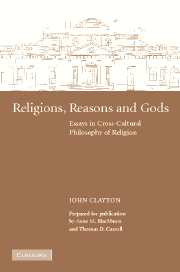Book contents
- Frontmatter
- Contents
- Editorial preface
- Acknowledgments
- List of abbreviations
- 1 Claims, contexts and contestability
- PART I REASON AND RELIGIOUS PLURALISM
- 2 Thomas Jefferson and the study of religion
- 3 Common ground and defensible difference
- 4 Religions, reasons and gods
- PART II THEISTIC ARGUMENTS IN PRE-MODERN CONTEXTS
- PART III THEISTIC ARGUMENTS IN EARLY-MODERN CONTEXTS
- Appendix: The 1997 Hulsean Sermon
- Bibliography
- Index
4 - Religions, reasons and gods
Published online by Cambridge University Press: 22 September 2009
- Frontmatter
- Contents
- Editorial preface
- Acknowledgments
- List of abbreviations
- 1 Claims, contexts and contestability
- PART I REASON AND RELIGIOUS PLURALISM
- 2 Thomas Jefferson and the study of religion
- 3 Common ground and defensible difference
- 4 Religions, reasons and gods
- PART II THEISTIC ARGUMENTS IN PRE-MODERN CONTEXTS
- PART III THEISTIC ARGUMENTS IN EARLY-MODERN CONTEXTS
- Appendix: The 1997 Hulsean Sermon
- Bibliography
- Index
Summary
Philosophers have tended to discuss theistic proofs (and theistic disproofs) largely in abstraction from their specific roles within the religious traditions in which those proofs were cultivated and in which, until modern times, they flourished. As a result, the traditional theistic proofs of the West are generally presented in the philosophical literature as no more than (failed) attempts to demonstrate or within tolerable limits to establish the probability of the existence of at least one god. Whatever the history of philosophy may suggest, the history of religions shows that theistic proofs have been developed from a variety of motives and have been employed to a variety of ends, only one of which is to persuade someone not already so inclined to believe that god/s exist. Indeed, this latter purpose is fairly subsidiary in the history of religions. A survey of the place and roles of theistic proofs and disproofs within a range of religious traditions, Eastern as well as Western, suggests that in the main they were used to serve intra-traditional ends. Their principal function seems to have been more nearly explanatory than justificatory. Even when they aimed them outside the tradition and used them to apologetic ends, purveyors of the proofs tended to assume prior belief in god/s on the part of their intended audience.
I
The specifically religious significance of theistic proofs has been too little explored in recent philosophy of religion.
- Type
- Chapter
- Information
- Religions, Reasons and GodsEssays in Cross-cultural Philosophy of Religion, pp. 80 - 98Publisher: Cambridge University PressPrint publication year: 2006



